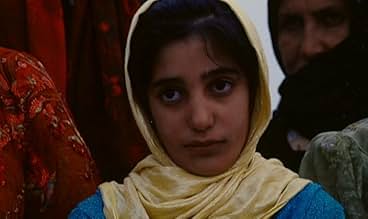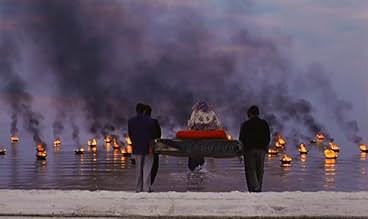IMDb RATING
7.7/10
1.1K
YOUR RATING
Rahmat has been asked to meet the inhabitants of these islands to collect their tears. Although for years people have been giving their tears to Rahmat, no one knows exactly what he has been... Read allRahmat has been asked to meet the inhabitants of these islands to collect their tears. Although for years people have been giving their tears to Rahmat, no one knows exactly what he has been doing with them.Rahmat has been asked to meet the inhabitants of these islands to collect their tears. Although for years people have been giving their tears to Rahmat, no one knows exactly what he has been doing with them.
- Awards
- 4 wins & 4 nominations
- Director
- Writer
- All cast & crew
- Production, box office & more at IMDbPro
Storyline
Did you know
- TriviaThis film, like Mohammad Rasoulof's other films, has never been screened in Iran.
Featured review
Last year at the San Sebastian Film Festival, Mohammad Rasoulof, Iranian director of the allegorical fable The White Meadows, spoke out against the Tehran regime saying "I come from a country full of contradictions and suffering, where there is a dictatorship," and "censorship does not allow me to talk openly about what happens in my country." The following March, both Rasoulof and world-acclaimed director Jafir Panahi were arrested as part of the government's reaction to those claiming that the election of President Ahmadinejad in June 2009 election was a fraud. Rasoulof was released shortly after his arrest in March but Panahi remained in prison until the following May.
The White Meadows, Rasoulof's mesmerizing and poetic film about an old man who travels to places of sorrow to collect tears, appears to be a disguised attack on the perils of religious dogmatism, though it also can be taken simply as a surreal Kafkaesque nightmare. Set in Lake Urmia close to Azerbaijan, Rahmat (Hasan Pourshirazi), an aging boatman, visits the region's white salt islands to collect people's tears in a glass vial. "I've come to listen to people's heartaches and take away tears," he says as he rows among the gray waters in the third-largest saltwater lake in the world. It is an otherworldly landscape.
Rahmat encounters many tales of grief and sees many injustices but he is powerless to intervene. He has been doing this for thirty years and the people cooperate because they believe that their tears will turn into pearls. What he does with the tears is not fully explained. We see him first at a funeral for a young woman whose body was preserved in salt until Rahmat can take her off the island and dispose of her body. It is not clear how the woman died but the implication is clear that she was killed, possibly by stoning, by having too provocative a figure. One of the villagers tells Rahmat that it was good that she had died because she was "too beautiful to live among us". She could not be buried on the island because lustful men would dig up her body and violate the corpse.
When Rahmat takes her in his boat, he uncovers her far from shore only to find a very much alive teenage boy, Nassim (Younes Ghazali), who snuck off the island so that he can look for his father. Rahmat first throws young Nissim into the cruel waters then relents and says that the boy can go with him if he pretends to be his deaf and mute son. Recalling that tears can turn into pearls, the naïve youngster steals a jar full of tears and is severely reprimanded by Rahmat when discovered. At the next island, a beautiful young virgin, dressed for a wedding, is offered as a bride to the sea to appease the sea gods. No one does anything to stop this barbaric action and Rahmat is content to fill up more vials of tears.
At the last minute Nissim swims out to sea to try and rescue her but he is intercepted and brought back to the island to be stoned by the elders. Rahmat saves his life but the boy is severely injured and once again the powerful succeed at the expense of the compassionate. On the next island, a crippled dwarf (Omid Zare) is chosen to deliver the secrets of the villagers (whispered into a glass jar) to the fairies at the bottom of a well before daylight. Fearing that he will not make it in time, the rope is cut and he perishes. An even more bizarre occurrence takes place at the next island. The White Meadows is an upsetting film filled with many tears, but it is a film of stark visual beauty aided by the powerful imagery of Ebrahim Ghafouri's camera-work. The film makes a strong statement about the need for morality and justice.
The White Meadows, Rasoulof's mesmerizing and poetic film about an old man who travels to places of sorrow to collect tears, appears to be a disguised attack on the perils of religious dogmatism, though it also can be taken simply as a surreal Kafkaesque nightmare. Set in Lake Urmia close to Azerbaijan, Rahmat (Hasan Pourshirazi), an aging boatman, visits the region's white salt islands to collect people's tears in a glass vial. "I've come to listen to people's heartaches and take away tears," he says as he rows among the gray waters in the third-largest saltwater lake in the world. It is an otherworldly landscape.
Rahmat encounters many tales of grief and sees many injustices but he is powerless to intervene. He has been doing this for thirty years and the people cooperate because they believe that their tears will turn into pearls. What he does with the tears is not fully explained. We see him first at a funeral for a young woman whose body was preserved in salt until Rahmat can take her off the island and dispose of her body. It is not clear how the woman died but the implication is clear that she was killed, possibly by stoning, by having too provocative a figure. One of the villagers tells Rahmat that it was good that she had died because she was "too beautiful to live among us". She could not be buried on the island because lustful men would dig up her body and violate the corpse.
When Rahmat takes her in his boat, he uncovers her far from shore only to find a very much alive teenage boy, Nassim (Younes Ghazali), who snuck off the island so that he can look for his father. Rahmat first throws young Nissim into the cruel waters then relents and says that the boy can go with him if he pretends to be his deaf and mute son. Recalling that tears can turn into pearls, the naïve youngster steals a jar full of tears and is severely reprimanded by Rahmat when discovered. At the next island, a beautiful young virgin, dressed for a wedding, is offered as a bride to the sea to appease the sea gods. No one does anything to stop this barbaric action and Rahmat is content to fill up more vials of tears.
At the last minute Nissim swims out to sea to try and rescue her but he is intercepted and brought back to the island to be stoned by the elders. Rahmat saves his life but the boy is severely injured and once again the powerful succeed at the expense of the compassionate. On the next island, a crippled dwarf (Omid Zare) is chosen to deliver the secrets of the villagers (whispered into a glass jar) to the fairies at the bottom of a well before daylight. Fearing that he will not make it in time, the rope is cut and he perishes. An even more bizarre occurrence takes place at the next island. The White Meadows is an upsetting film filled with many tears, but it is a film of stark visual beauty aided by the powerful imagery of Ebrahim Ghafouri's camera-work. The film makes a strong statement about the need for morality and justice.
- howard.schumann
- Mar 15, 2012
- Permalink
- How long is The White Meadows?Powered by Alexa
Details
- Runtime1 hour 32 minutes
- Color
Contribute to this page
Suggest an edit or add missing content








